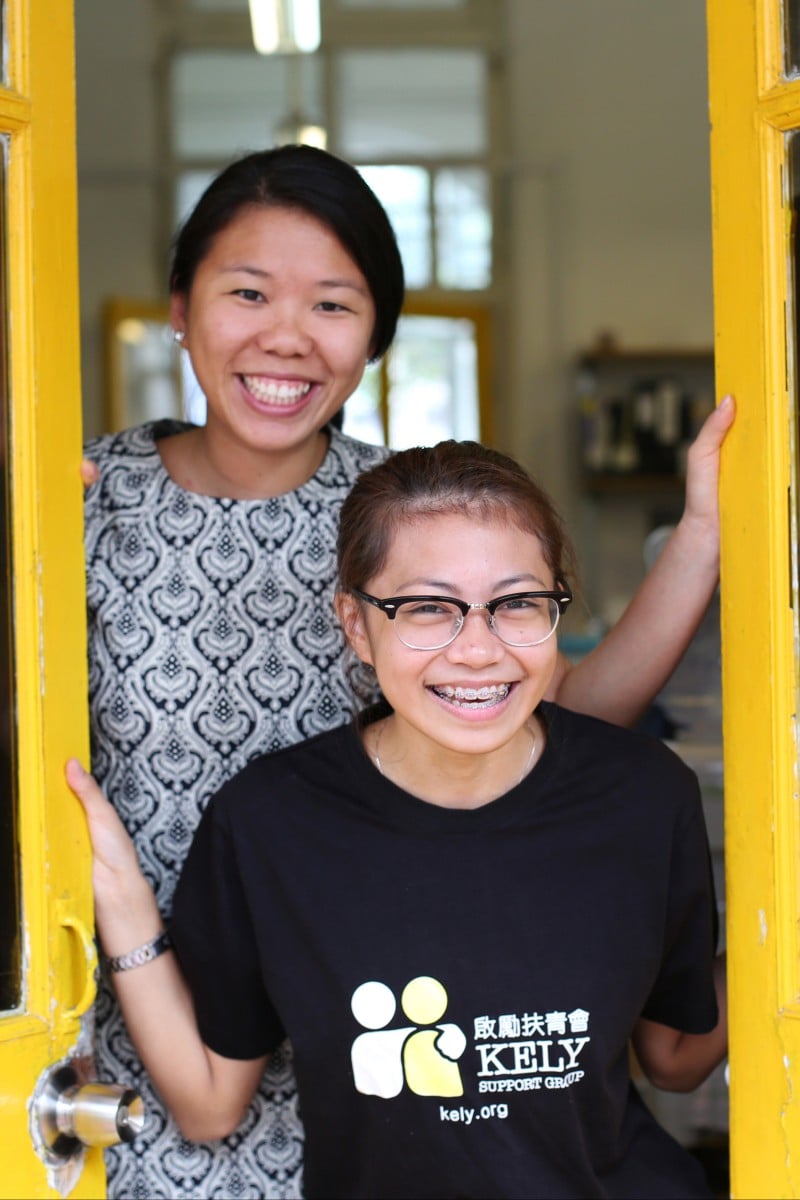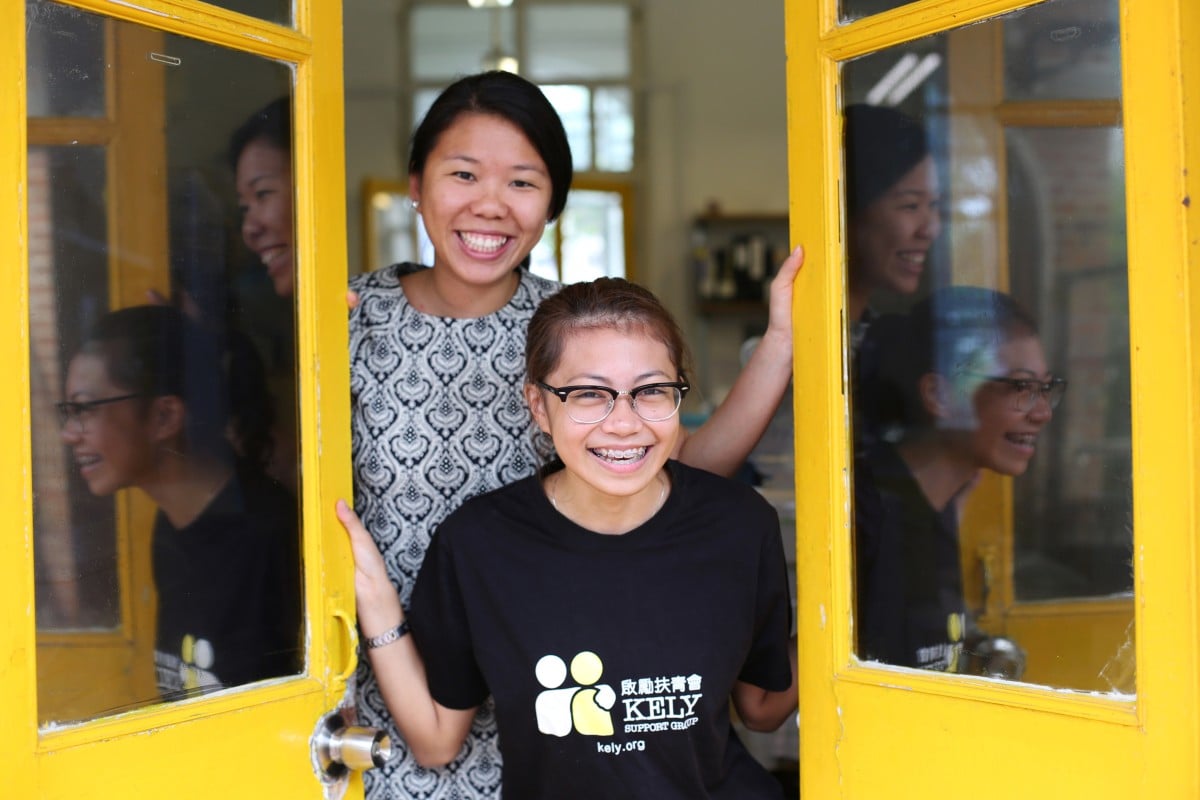
30 years of empowering youth in Hong Kong: KELY Support Group
- Since it was founded 30 years ago, the non-profit organisation has helped countless teenagers and young people in Hong Kong
- One of them is John Joseph Ledesma Caguinguin, a Filipino who grew up in Hong Kong, and who found his path to working in architecture through one of KELY’s work placement programme
 Sky Siu (back) has been with the KELY Support Group for 10 years. The NGO has helped a lot of teenagers in Hong Kong, including Xyra Sace (back). Photo: Nora Tam
Sky Siu (back) has been with the KELY Support Group for 10 years. The NGO has helped a lot of teenagers in Hong Kong, including Xyra Sace (back). Photo: Nora TamIn secondary school, John Joseph Ledesma Caguinguin was focused mostly on playing video games. Working full-time at an architecture studio in five years would have seemed like a faraway dream.
But his dream came true after one small decision he made on a whim – to sacrifice four weekends and attend a career workshop.
It is no exaggeration to say that a four-week course set his life on a different path, from being a passive student, to having a full-time job in an architecture studio, and a chance to study abroad.
“It really shaped me. [If I hadn’t gone] I’d probably be at home playing video games,” said the 21-year-old Filipino who grew up in Hong Kong.
The Open Door Work Placement Programme that Caguinguin joined was organised by the KELY Support Group, which turned 30 this year. The non-profit organisation helps equip young people with the skills and knowledge needed to reach their full potential. Not only does the placement programme help teenagers with writing résumés, they are also trained to handle interviews with confidence.
Caguinguin first saw the workshop advertised at his school, the Delia Memorial School (Hip Wo). It was held over the weekend, and other students didn’t show an interest.
But Caguinguin had dreams of being an architect, and he had a feeling this programme could help him.
In four weeks, he completed the programme and left with a totally new perspective. With KELY’s help, he was given the chance to intern at the Design852 architecture studio. He later graduated with a higher diploma in architectural studies from the University of Hong Kong’s SPACE programme, and Design852 invited him to work there full-time.
The initiative by KELY Support Group that gives teenagers mental health support
Last year, he took part in the BoConcept Home Design Award and won first place. Next month, he’s off to the University of Plymouth, in England, where he will finally achieve his goal of doing an undergraduate degree in architecture.
“I got to see my dream come to life,” he said.
It’s thanks to volunteers, like Terrence Vuu, a teacher at the Delia School of Canada, who make these workshops happen.
“I didn’t have role models growing up. Without similar outreach programmes at my school, I wouldn’t be where I am today,” he said. As a Vietnamese who grew up in Canada, Vuu understood what it meant to be an ethnic minority and knows the value of such workshops.
Sky Siu, the Executive Director at KELY, has been with the organisation for 10 years.
“I wish I listened to people more [when I was a teenager] – I often thought I was old enough to know better,” she said.
She acknowledges that teenagers today are more than capable of making better decisions when faced with difficult situations.
“Our primary aim is to equip youth with the right tools and resources so they can help themselves and those around them,” she said.
KELY’s founder Samantha Martin knows all too well that teenagers simply want to connect and relate to someone, especially when they are dealing with personal problems. When she first started the group in 1991, all the focus was on alcohol and substance abuse, a huge challenge then.
“There was no help [at the time]. There were no resources [for young people],” she said. “We were a group of people who got together to try and save one life. There were no workshops. There were no newsletters. It was literally a telephone and table.”
KELY, which stands for Kids Everywhere Like You, began as a pseudonym, Kelly, because Martin wanted to be someone others could speak to.
“We left a phone number [in the newspaper] for people to call if they wanted to talk about a problem, not thinking anybody would. But the phone rang off the hook. People called anonymously and were desperately seeking out,” she said.
To manage the demand, she hosted the first meeting in her living room. She said: “I took down all the numbers and I called them back to say ‘I don’t care who you are or where you come from, but you’re welcome to come on this day at this time’. We had a full house that night and it was people who were desperately seeking help on all levels. We were talking really about addiction.”
Martin knows that addiction is a disease, and in order to break the cycle, people need a judgment-free space to speak and be heard – that is when change can start. Even though the problems have morphed over the decades, whether they are substance abuse or bullying or mental health issues, the solution is the same.
“KELY’s changed a lot from the original, and I think that the work they’ve done is incredible. The fact that they’ve survived 30 years as a non-profit – I take my hat off to them,” she said.
